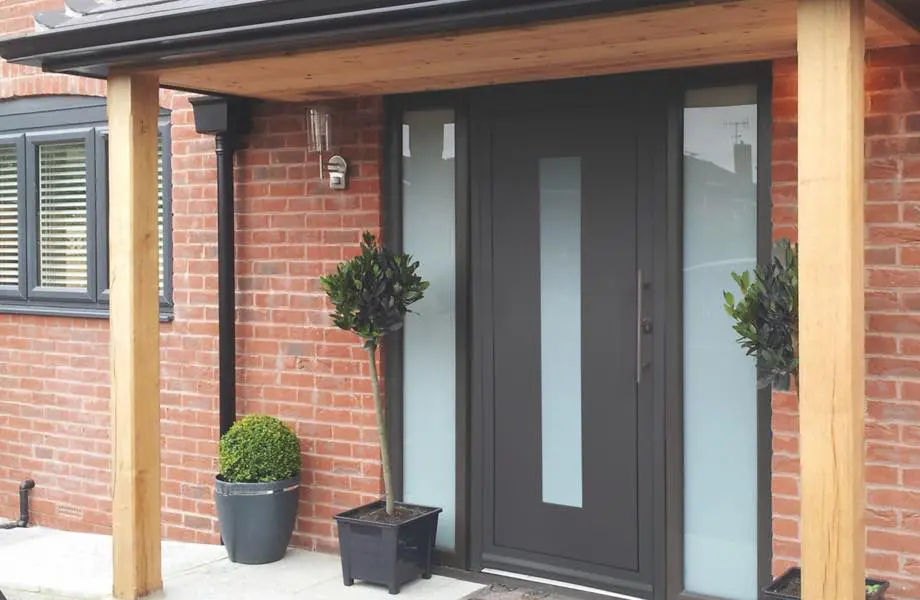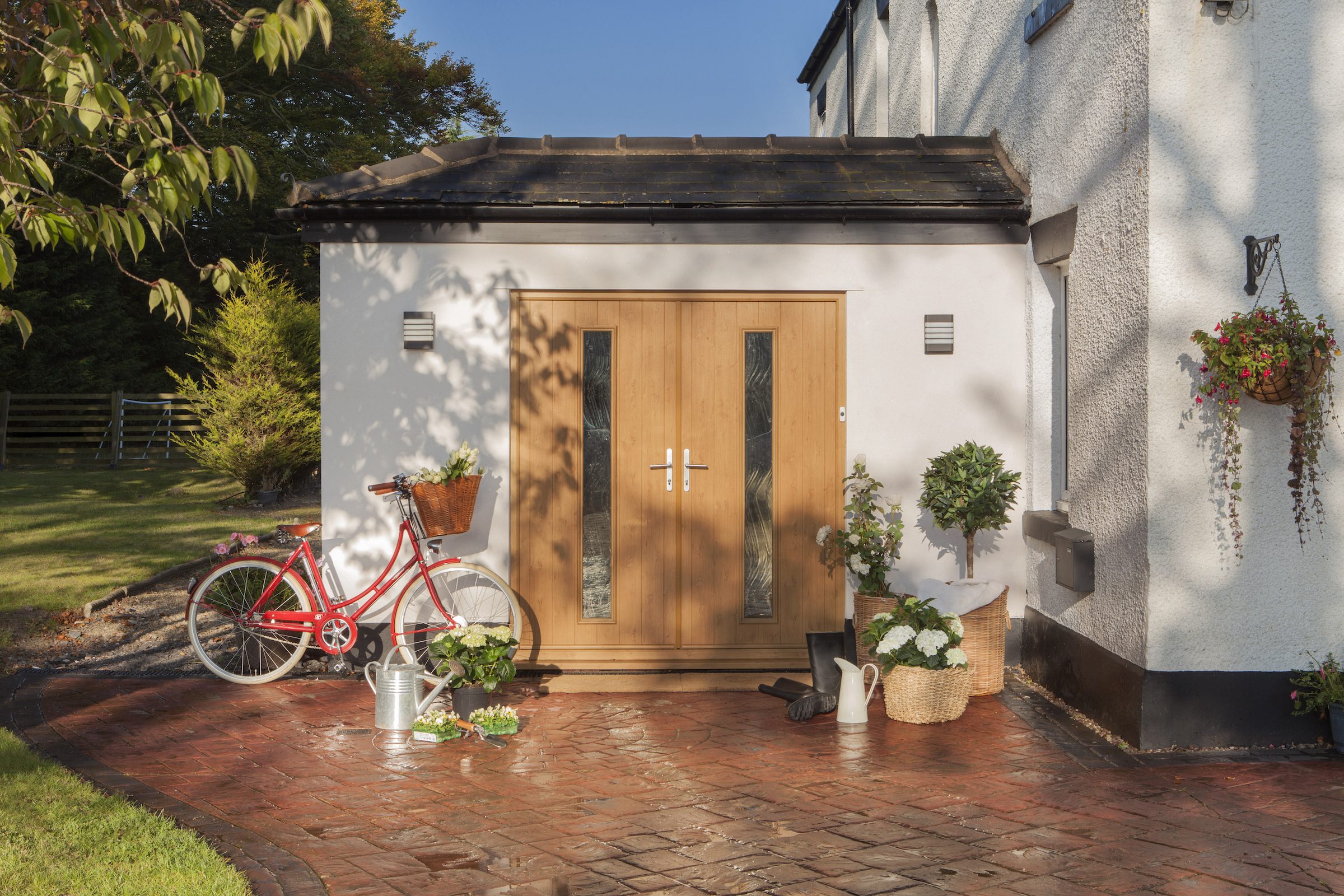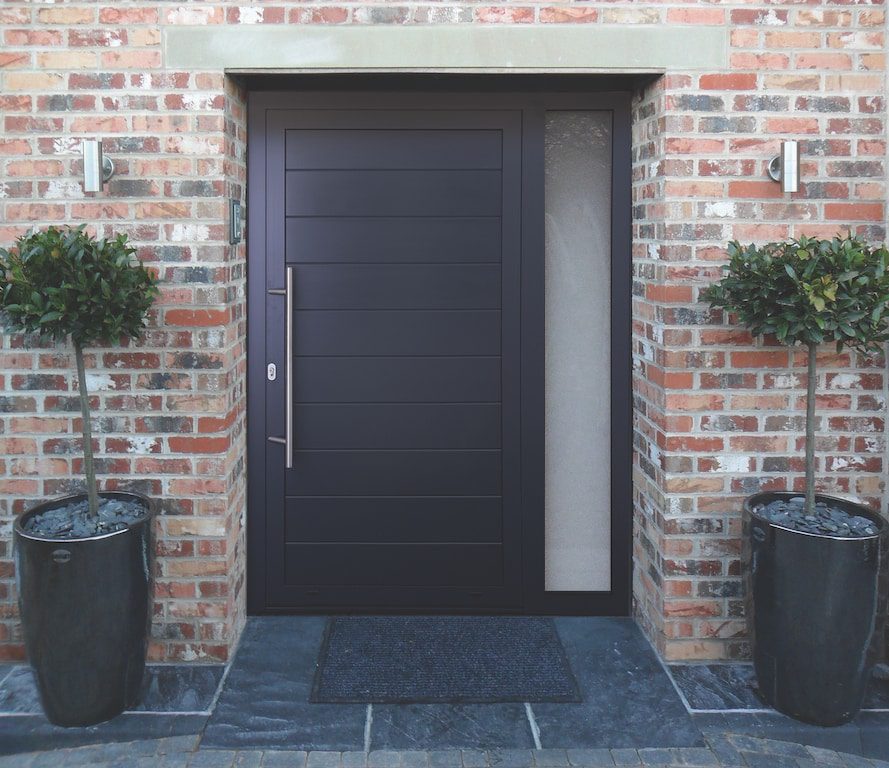When comparing these two front door types, the key differences are price, aesthetics, visible and actual quality and how the doors are designed and made. Both composite and aluminium doors provide a secure and stylish front door solution for a home. Here are the key differences between aluminium and composite doors.
Composite doors vs aluminium doors – comparing materials

The noticeable difference when comparing composite doors vs aluminium doors is the materials used and how these affect the overall look and feel of the front door.
Composite doors mostly use a PVCu outer frame. Aluminium doors use slimmer and stronger aluminium. Both aluminium and PVCu doors use an outer frame from the major system companies. For composite doors, frames can include those from Rehau, Kommerling, Deceuninck, Spectus and others.
Composite door material pros
- Fewer colour options
- More wood-effect options
- Wider choice of frame styles
Composite door material cons
- Thicker than aluminium
- Not as strong as aluminium
- Less modern looking
Aluminium front doors also use frame profiles from the major system companies and brands, with a bought-in or self-manufactured door panel.
Aluminium door material pros
- Slimmer and stronger.
- Looks more modern.
- More standard colour options..
Aluminium door material cons
- Fewer traditional design options.
- Hard to find in a wood-effect.
- Paint needs repair if damaged.
Aluminium doors vs composite doors – design and construction
When comparing aluminium and composite front doors, two noticeable differences is how they are designed and made.
On composite doors, the door leaf comprises either a polyurethane thermal core or a solid timber core. The timber core is always the thicker, better and higher quality composite door option and comes recommended. Externally, the thermal core is covered with two decorative PVC outer skins glued to the core and in various colours and designs. Composite door PVCu frames use a welded construction.
Both aluminium and composite doors are well insulated. PVCu uses multi-chamber profiles combined with the insulated door slab. Aluminium doors use thermally insulated profiles working with the thermal core of the door leaf. And because all the aluminium components use the same colouring process, colour consistency is more likely with an aluminium door than a composite door. Colour accuracy, although generally good, cannot be guaranteed with composite doors because the components come from different suppliers.
For the decorative panel, whether solid or partially glazed, you’ll get a strong and reliable panel when comparing both aluminium doors vs composite doors. Composite doors with a solid timber core, like Solidor or Endurance, offer the best feel. It’s also logical that a solid timber core is perceived as better than foam or polyurethane.
Another visible difference comparing composite and aluminium doors is the cassettes used to house the glass on the composite model. Some cheaper models show the fixings holding the cassette in place, which can look unsightly. Aluminium doors use aluminium for their cassettes, not plastic, and the look is altogether better by design.
Whilst you do get contemporary designs with composite doors, in many cases composite doors more often try to replicate the look of a timber door. Most recreate this look well with the grained wood-like appearance that is harder to achieve with aluminium front doors.
Composite door design pros
- Simple design makes doors faster to make.
- Traditional doors look more authentic.
- Solid core doors feel like a wood door.
Composite door design cons
- Harder to achieve a premium look.
- Feels less robust than aluminium.
- Cheaper doors are less robust.
The design and manufacture of aluminium front doors is more sophisticated, with a longer manufacturing process. The use of aluminium throughout the door set creates a more luxurious-looking door compared to composite doors.
Aluminium or steel door panels utilise an altogether different construction simply because having an all-metal design is better than PVC. The type of panel you get with aluminium or aluminium/steel doors depends on how the door is designed as there are many types of styles.
Overall, aluminium doors benefit from consistency with a more streamlined and coherent look and they don’t try to replicate a wood door, although wood-effect finishes are available. The painting process on aluminium doors is more advanced and looks more authentic – it’s not pretending to be another material. Aluminium doors are powder coated using an advanced coating process.
Aluminium door material pros
- Better colour consistency.
- Doors have a visible higher quality.
- Aluminium frame joints look neater.
Aluminium door material cons
- Longer lead times.
Thicker door panels with aluminium
When comparing composite doors vs aluminium doors the thickness of the door panel itself may be a deciding factor, but this depends on the door you choose. For instance, Origin doors use the ‘glazed-in’ panel design which won’t be as thick as a door designed to be thicker at up to 90mm.
Composite doors vs aluminium doors – thermal expansion
It is widely reported on various online window-fitter forums about issues with twisting or expanding composite doors. It is also well known about PVCu having more thermal expansion than aluminium. Composite doors in a darker colour and on sunnier elevations may be prone to thermal expansion resulting in sticking doors or being hard to lock. Darker colours are especially problematic on composite doors.
The reduced thermal expansion on aluminium is widely known to provide significantly more reliable doors with none of the issues of composite doors when facing the sun.
Where composite doors are better than aluminium doors

There are several areas where composite doors are actually better than aluminium doors. Composite doors are best when you want a traditional style. Composite doors are also best for stable doors. These are doors where the top half of the door opens like a window creating ventilation and they’re great in older houses. The only other option for stable doors is timber or hybrid doors. Aluminium doors aren’t available with a stable door design.
When you want a really good front door at a low price, composite doors are hard to beat. Comparing composite doors vs. aluminium doors on price, expect to pay around 40%-60% more for a mid-range model in aluminium. So composite doors are better for those on a budget, rental properties and houses being renovated to sell on.
One advantage of composite doors vs aluminium doors is their option for having a fire-rated model. Aluminium has no fire rating, so you’ll either have to go with a fire-rated steel door or a suitable steel-clad aluminium system.
Composite door pros
- Stable door design.
- The cheapest front door option.
- Fire-rated front door option.
Where aluminium doors are better than composite doors

For those homeowners looking for a higher quality, or luxury front door, aluminium provides more options compared to composite doors. Aluminium remains a more high-end product and composite doors are never perceived as top end or luxurious.
Aluminium also offers significantly better sizes than composite doors. They go wider and taller than composite doors. The benefit is that some doorways using a composite door mean having a side panel or glaze panel above where you can have a complete door set in aluminium.
It’s also the same for smaller doorways. Composite doors struggle to get below 800mm wide, and many older cottages need narrow doors. Aluminium doors can go as narrow as 400mm with many models, so they’re a better solution here.
Where composite doors are better for traditional designs with a good choice of modern, aluminium is the go-to product for contemporary doors. Compare the two products side by side, and you’ll see how much better aluminium doors look in the modern style. Smaller or even concealed hinges, bold architectural quality door handles, metal strips and modern glass. All these features just work and look better in an aluminium door.
Above all, it’s life expectancy. Aluminium front doors will last longer than composite doors with routine cleaning and periodic adjustments if needed. Of course, composite doors vary in quality and price, but look at the faded front doors on many new homes using composite materials.
Aluminium door pros
- Better for large or small doors.
- Best for luxury doors.
- Gives genuine architectural quality.
Security on composite doors vs aluminium doors
The good news is both door types provide excellent security high quality hardware, secure door cylinders and multi-point locking.
As both aluminium and composite doors undergo similar security testing methods and pass, there’s little to worry about for front door security.
Energy efficiency on composite doors vs aluminium doors
The U-Values you get comparing composite doors vs aluminium doors depend on the thickness of the panel and the product itself. Both door types should meet current Building Regulations.
Depending on the model, aluminium doors offer similar or better ratings with Passivhaus doors available and aluminium panels with U-Values well below 1.0Wm2K. The lower the U-Value, the more energy-efficient the product.
Composite doors vs aluminium doors – how much do they cost?
What you can expect to pay for composite doors mainly depends on whether you choose a door with a solid core or a cheaper infill.
Composite doors cost from £1000 up to £2500.
Aluminium doors have so many brands, varying specifications, size capability and designs, all these factors affect the price you pay.
A more standard aluminium front door starts at around £1800, up to £10000 or more for the top-of-the-line brands. Some aluminium brands are now priced at virtually composite door prices.
More information about aluminium front doors
When comparing aluminium doors vs composite doors, an aluminium door looks better, lasts longer and is a more flexible product suiting more property types. Composite doors are widely available, offer a better solution for those on a budget and are better when you want to get the look of a wood door.
Whether you choose a composite or an aluminium door, both are well-insulated, reliable and secure, with a good guarantee. Budget, design and quality are usually the deciding factors. Get in touch for more information about where to buy aluminium front doors near you.











